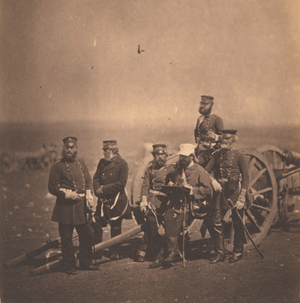Bibliography
This bibliography is taken from History Online, which provides bibliographic information on books and journal articles published by UK academic publishers. The bibliography below represents a selection of books on topics related to war in History Online. Search History Online for other books and journal articles.
Publishers
- Ashgate
- Blackwell
- Boydell and Brewer
- Cambridge University Press
- Duckworth
- Frank Cass
- Hodder Arnold
- Longman History
- Manchester University Press
- Oxford University Press
- Palgrave Macmillan
- Pheonix Press
- Yale University Press
Ashgate
The Warrior Saints in Byzantine Art and Tradition
Christopher Walter
 In this study of the cult and iconography
of Byzantine warrior saints, Christopher Walter delineates their
origins and development as a distinctive category of saint,
showing that in its definitive form this coincides with the
apogee of the Byzantine empire in the 10th-11th centuries. With
a repertory of their commemorations and representations, he
sets out their iconographical types and the functions ascribed
to them in the celestial army, supporting the terrestrial army
on the offensive, and gaining a new protective role when it
moved to the defensive. Features noted are the development of
an echelon of military saints, notably in church decoration,
which provides the surest basis for defining their specificity;
and that their depiction, besides showing them as young, handsome
and robust, resorted to ‘twinning’ them in pairs,
calling attention to the camaraderie of soldiers. The work also
opens a new perspective on the military history of the Byzantine
Empire. The Byzantine ideology of war is seen consistently to
follow that of the Israelites; protected and favoured by divine
intervention, there was no need to discuss the morality of a
‘just war’; and when considering Byzantine methods
of warfare, due attention should be given to the important role
they attributed to celestial help in their campaigns.
In this study of the cult and iconography
of Byzantine warrior saints, Christopher Walter delineates their
origins and development as a distinctive category of saint,
showing that in its definitive form this coincides with the
apogee of the Byzantine empire in the 10th-11th centuries. With
a repertory of their commemorations and representations, he
sets out their iconographical types and the functions ascribed
to them in the celestial army, supporting the terrestrial army
on the offensive, and gaining a new protective role when it
moved to the defensive. Features noted are the development of
an echelon of military saints, notably in church decoration,
which provides the surest basis for defining their specificity;
and that their depiction, besides showing them as young, handsome
and robust, resorted to ‘twinning’ them in pairs,
calling attention to the camaraderie of soldiers. The work also
opens a new perspective on the military history of the Byzantine
Empire. The Byzantine ideology of war is seen consistently to
follow that of the Israelites; protected and favoured by divine
intervention, there was no need to discuss the morality of a
‘just war’; and when considering Byzantine methods
of warfare, due attention should be given to the important role
they attributed to celestial help in their campaigns.
Published 2003; ISBN: 184014694X
Warfare and Military Organization in Pre-Crusade Europe
Bernard S. Bachrach
Variorum Collected Studies Series: CS720
Throughout the history of Western civilization, war, preparation for war, and its aftermath have dominated the use of surplus human and material resources. Yet, despite our recent history, the brute facts of military history are too often ignored by those who have instead sought to provide a more ideal understanding of the Middle Ages in Europe. This predilection for chivalry at the expense of logistics and for ‘just war theory’ at the expense of military technology have distorted both scholarly and popular understanding of the role played by military matters in the Middle Ages. The aim of the fourteen articles reprinted here is to help provide a more balanced view, offsetting notions of romanticism and an anthropologically inspired primitivism of a Dark Age in pre-Crusade Europe. Particular topics include: the survival of Classical influences into the early Middle Ages; the strategy of castle-building in the early Angevin domains; and William the Conqueror’s preparations for the invasion of England.
Published 2002; ISBN: 0860788709
Guns and Men in Medieval Europe, 1200–1500
Studies in military history and technology
Kelly DeVries
Variorum Collected Studies Series: CS747
These articles are devoted to the two main aspects of medieval warfare: men and technology. Men fought, led, and ultimately killed in war, while the technology that they used facilitated these tasks. The first group of essays highlights human strengths in the fighting of medieval wars, with a focus on events of the 14th and 15th centuries, specifically the Anglo-French wars and wars against the Turks. A second group addresses the technological side of warfare, in particular the advent and proliferation of early gunpowder weapons which evolved rapidly during the late Middle Ages, although never replacing the role of men. The articles study various facets of this evolution, from the increased use and effectiveness of guns in battles, sieges, and naval warfare, to changes in their science and metallurgy, surgical treatment of wounds caused by them, and governmental centralization of the technology.
Published 2002; ISBN: 0860788865
The Battle of the Atlantic and Signals Intelligence
U-boat Tracking Papers 1941–1947
Edited by David Syrett
Navy Records Society Publications
Focusing on the collection, analysis, and employment of signals intelligence materials by the Royal and United States navies during the Second World War, this volume throws new light on how the Allies obtained victory over the U-boats during the Battle of the Atlantic.
Published 2002; ISBN: 0754631230
Warriors and their Weapons around the Time of the Crusades
Relationships between Byzantium, the West and the Islamic world
David Nicolle
Variorum Collected Studies Series: CS756
The technological relationship between the three main civilizations of the Western world - Byzantium, the Islamic world and the West - most particularly in the area of arms, armour and military technology is a field of research for which David Nicolle is noted. This volume deals principally with Western Europe and Byzantium, which for many centuries learnt from the Muslims in these matters; several articles also focus on military interactions in the Crusader states. The work draws upon both written and archaeological sources, but above all makes use of the depictions of war and military equipment in contemporary art to examine the interconnections across the medieval world.
Published 2003; ISBN: 0860788989
London's War
The Shelter Drawings of Henry Moore
Julian Andrews
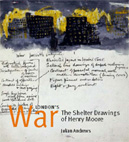 Early in the Second World War, Henry Moore
had to give up working on sculpture when his Hampstead studio
was bombed. Instead he concentrated on drawing, creating a monumental
series of works showing the plight of people sheltering in the
London Underground. This is the first book to consider Moore's
visual documentation of the shelters within the context of the
events of the London Blitz of 1940–41. Julian Andrews
looks at Moore's personal and political feelings about the coming
war and his doubts about working as an Official War Artist,
comparing Moore's wartime drawings to works by other artists
and to documentary photographs. In addition, the author considers
the influence of the Shelter Drawings on people's feelings about
the Blitz and their effect on public attitudes towards Moore's
work.
Early in the Second World War, Henry Moore
had to give up working on sculpture when his Hampstead studio
was bombed. Instead he concentrated on drawing, creating a monumental
series of works showing the plight of people sheltering in the
London Underground. This is the first book to consider Moore's
visual documentation of the shelters within the context of the
events of the London Blitz of 1940–41. Julian Andrews
looks at Moore's personal and political feelings about the coming
war and his doubts about working as an Official War Artist,
comparing Moore's wartime drawings to works by other artists
and to documentary photographs. In addition, the author considers
the influence of the Shelter Drawings on people's feelings about
the Blitz and their effect on public attitudes towards Moore's
work.
Published 2002; ISBN: 0853318441
Series: Crusade Texts In Translation
Series Editors: Malcolm Barber, Peter Edbury, Bernard Hamilton and Norman Housley
A full list of books in this series can be accessed by visiting the web page Crusade Texts In Translation. The three books listed below are part of this series.
The Rare and Excellent History of Saladin
Translated with introduction and notes by D.S. Richards, University of Oxford, UK
Crusade Texts in Translation: 7
 Saladin is perhaps the one and only Muslim
ruler who emerges with any clarity in standard tales and histories
of the Crusades; this is a translation of Baha’ al-Din
Ibn Shaddad’s account of his life and career. Ibn Shaddad
(1144–1234) was clearly a great admirer of Saladin and
was a close associate of his, serving as his qadi al-‘askar
(judge of the army), from 1188 until Saladin’s death in
1193. His position and his access to information make this an
authoritative and essential source for Saladin’s career,
while his personal relationship with the sultan adds a sympathetic
and moving element to the account of his final years.
Saladin is perhaps the one and only Muslim
ruler who emerges with any clarity in standard tales and histories
of the Crusades; this is a translation of Baha’ al-Din
Ibn Shaddad’s account of his life and career. Ibn Shaddad
(1144–1234) was clearly a great admirer of Saladin and
was a close associate of his, serving as his qadi al-‘askar
(judge of the army), from 1188 until Saladin’s death in
1193. His position and his access to information make this an
authoritative and essential source for Saladin’s career,
while his personal relationship with the sultan adds a sympathetic
and moving element to the account of his final years.
Aside from its inherent value as a source for the history of Egypt and the Middle East, it therefore provides a much-needed complement and corrective to the widely-known Latin accounts of the Crusades and the Latin Kingdom of Jerusalem in the 12th century. The present translation is based on a fuller edition of the text than that used in the previous 19th-century translation, and takes into account the translator’s readings of the earliest manuscript of the work, dated July 1228.
Published 2001; ISBN: 0754601439 Hardback - Published 2002; ISBN: 0754633810 Paperback
The Crusade against Heretics in Bohemia, 1418–1437
Sources and documents for the Hussite Crusades
Thomas A. Fudge
Crusade Texts in Translation: 9
This selection of over 200 texts, nearly all appearing for the first time in English translation, provides a close-up look at the crusades against the Hussite heretics of 15th-century Bohemia, from the perspective of the official Church - or at their struggles for religious freedom, from the Hussites' own point of view. It also throws light on the meaning of the crusading movement and on the nature of warfare in the late Middle Ages. There is no single documentary account of the conflict, but the riveting events can be reconstructed from a wide range of contemporary sources. These texts reveal the zeal and energy of the crusaders but also their deep disunity, growing frustration and underlying fears - and likewise the heresy, determination and independence of the Hussites. Five times the cross was preached and the vastly superior forces of the official church and the empire marched into Bohemia to suppress the peasant armies. Five times they were humiliated and put to flight.
Published 2002; ISBN: 0754608018
The Book of Deeds of James I of Aragon
A translation of the medieval Catalan Llibre dels Fets
Damian Smith and Helena Buffery
Crusade Texts in Translation: 10
The ‘Book of Deeds’ is the first known autobiography by a Christian king. Its author was James I of Aragon (1213–76), known as ‘The Conqueror’, one of the great political figures of 13th-century Europe and a successful crusader. In his ‘Deeds’, James describes the turbulent years of his minority, the thrilling capture of Majorca, the methodical conquest of the kingdom of Valencia, the reconquest of the kingdom of Murcia after Castile had failed to hold it, and many of the important events of his reign. While crusade and conquest of Spanish territory from the Muslims and Christian-Muslim relations on the frontier are central features of the account, the ‘Deeds’ are also a treasure trove of information on the image, power and purpose of monarchy, loyalty and bad faith in the feudal order, the growth of national sentiment, and medieval military tactics. At the same time, the book presents a unique insight into the mind of a medieval ruler, the supreme example we possess of the fears and ambitions of a man at the very centre of events.
Published 2003; ISBN: 0754603598
Blackwell
A Companion to the Vietnam War
Edited By: Marilyn Young, Robert Buzzanco
 A Companion to the Vietnam War contains twenty-four definitive
essays on America's longest and most divisive foreign conflict.
It represents the best current scholarship on this controversial
and influential episode in modern American history.
A Companion to the Vietnam War contains twenty-four definitive
essays on America's longest and most divisive foreign conflict.
It represents the best current scholarship on this controversial
and influential episode in modern American history.
- Presents twenty-four original essays written and edited by premier experts in Vietnam War history.
- Highlights issues of nationalism, culture, gender, and race.
- Covers the breadth of Vietnam War history, including American war policies, the Vietnamese perspective, the antiwar movement, and the American home front.
- Surveys and evaluates the best scholarship on every important era and topic.
- Includes a select bibliography to guide further research.
Published: 2002; ISBN: 063121013X
The English Civil War
The Essential Readings
Peter Gaunt
 This
book brings together twelve of the most influential articles
on the English Civil War, including coverage of all the major
debates on this key period in British history.
This
book brings together twelve of the most influential articles
on the English Civil War, including coverage of all the major
debates on this key period in British history.
- Provides students with an affordable collection of key articles on the English Civil War.
- Includes a substantial introduction which contextualises the articles and the issues they raise
- Examines and provides a guide to major recent and current areas of debate on the causes, course and consequences of the Civil War.
- Discusses military and political affairs alongside social, religious and economic developments.
Published 2000; ISBN: 0631208089 Hardback; ISBN: 0631208097 Paperback
Boydell and Brewer
The Battle of the Golden Spurs (Courtrai, 11 July 1302)
A Contribution to the History of Flanders' War of Liberation,
1297-1305
J.F. Verbruggen
Edited by Kelly DeVries
Translated by David Richard Ferguson
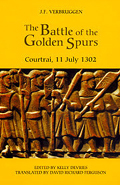 On 11 July 1302, below the town walls of Courtrai,
the most splendid army of knights in Christendom, the flower
of the French nobility, was utterly defeated by Flemish rebels,
common workers and peasants. The French knights, products of
a lifetime's training, were ably led; but so too were the Courtrai
townspeople, in addition to being well-armed, and their victory,
despite their lack of military skills (and golden spurs), put
an end to the enduring myth of the invincibility of the knight.
A French explanation of the terrible defeat was immediately
given, intended to save the honour and pride of the French nobility;
in Flanders the victory was glorified as a just reward for the
bravery of the townsmen and the competence of their commanders.
Unfortunately there were no impartial witnesses. Any account
of the battle must therefore pay careful attention to the personalities
of the chroniclers, their nationality, and their political and
social leanings, as well as their personal sympathies. Verbruggen's
study is prefaced by discussion of the problems of reconstruction
and extensive consideration of the sources, showing the difficulties
faced by medieval military historians in attempts to interpret
them. He then offers his own account of the events of that dramatic
day, a case study in the reconstruction of events in one of
the greatest battles of the middle ages. J.F. VERBRUGGEN lectured
at the Royal Military School in Brussels, and then taught in
Africa, retiring as Professor of History, University of Congo,
and University of Bujumbura (Burundi). He is also the author
of The Art of Warfare in Western Europe. Originally published
in Dutch in 1954, translated and updated.
On 11 July 1302, below the town walls of Courtrai,
the most splendid army of knights in Christendom, the flower
of the French nobility, was utterly defeated by Flemish rebels,
common workers and peasants. The French knights, products of
a lifetime's training, were ably led; but so too were the Courtrai
townspeople, in addition to being well-armed, and their victory,
despite their lack of military skills (and golden spurs), put
an end to the enduring myth of the invincibility of the knight.
A French explanation of the terrible defeat was immediately
given, intended to save the honour and pride of the French nobility;
in Flanders the victory was glorified as a just reward for the
bravery of the townsmen and the competence of their commanders.
Unfortunately there were no impartial witnesses. Any account
of the battle must therefore pay careful attention to the personalities
of the chroniclers, their nationality, and their political and
social leanings, as well as their personal sympathies. Verbruggen's
study is prefaced by discussion of the problems of reconstruction
and extensive consideration of the sources, showing the difficulties
faced by medieval military historians in attempts to interpret
them. He then offers his own account of the events of that dramatic
day, a case study in the reconstruction of events in one of
the greatest battles of the middle ages. J.F. VERBRUGGEN lectured
at the Royal Military School in Brussels, and then taught in
Africa, retiring as Professor of History, University of Congo,
and University of Bujumbura (Burundi). He is also the author
of The Art of Warfare in Western Europe. Originally published
in Dutch in 1954, translated and updated.
Published 2002; ISBN: 0851158889 Hardback
The Wars of Edward III
Sources and Interpretations
Edited by Clifford J. Rogers
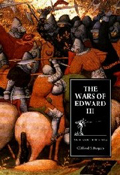 When
Edward III came to the throne of England in 1327, England's
military reputation had reached a low ebb. The young king's
first campaign against the Scots was a complete failure, and
the next year the 'Brian shameful peace' set the seal on Robert Bruce's
victory in the First Scottish War of Independence. Twenty-two
years later, however, King Jean II of France and King David
II of Scotland were both prisoners in London, an English army
was camped outside Paris, and Edward was widely considered the
most skilful warrior in the world.
When
Edward III came to the throne of England in 1327, England's
military reputation had reached a low ebb. The young king's
first campaign against the Scots was a complete failure, and
the next year the 'Brian shameful peace' set the seal on Robert Bruce's
victory in the First Scottish War of Independence. Twenty-two
years later, however, King Jean II of France and King David
II of Scotland were both prisoners in London, an English army
was camped outside Paris, and Edward was widely considered the
most skilful warrior in the world.
Clifford Rogers uses contemporary documents (campaign bulletins, administrative documents, and excerpts from 29 different chronicles) to tell the story of the battles, sieges, and chevauchées that produced this remarkable reversal - and the subsequent restoration of French fortunes under Du Guesclin and Charles V. The majority of the texts employed have never before been translated into modern English (and a number have never been published before in any language). Complementing these primary source materials are eight classic articles covering the Scottish Wars, the outbreak of the Hundred Years War, the recruitment, organisation and supply of English armies, English strategy and war aims, and the war's impact on French society and on the development of Parliament in England. Together, they provide a complete introduction to the topic. Dr Clifford J. Rogers teaches at the United States Military Academy at West Point.
Published 2000; ISBN: 0851156460 Hardback
Cambridge University Press
The Unquiet Western Front
Britain’s Role in Literature and History
Brian Bond
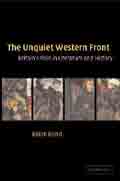 Britain’s outstanding military achievement
in the First World War has been eclipsed by literary myths.
Why has the Army’s role on the western front been so seriously
misrepresented? This book shows how myths have become deeply
rooted, particularly in the inter-war period, in the 1960s,
and in the 1990s. The outstanding ‘anti-war’ influences
have been ‘war poets’, subalterns’ trench
memoirs, the book and film of All Quiet on the Western Front,
and the play Journey’s End. For a new generation in the
1960s the play and film of Oh What a Lovely War had a dramatic
effect, while more recently Blackadder has been dominant. Until
recently historians had either reinforced the myths, or had
failed to counter them. This book follows the intense controversy
from 1918 to the present, and concludes that historians are
at last permitting the First World War to be placed in proper
perspective.
Britain’s outstanding military achievement
in the First World War has been eclipsed by literary myths.
Why has the Army’s role on the western front been so seriously
misrepresented? This book shows how myths have become deeply
rooted, particularly in the inter-war period, in the 1960s,
and in the 1990s. The outstanding ‘anti-war’ influences
have been ‘war poets’, subalterns’ trench
memoirs, the book and film of All Quiet on the Western Front,
and the play Journey’s End. For a new generation in the
1960s the play and film of Oh What a Lovely War had a dramatic
effect, while more recently Blackadder has been dominant. Until
recently historians had either reinforced the myths, or had
failed to counter them. This book follows the intense controversy
from 1918 to the present, and concludes that historians are
at last permitting the First World War to be placed in proper
perspective.
Published 2002; ISBN: 0521809959 Hardback
The Origins of the World War 1
Edited by Richard F. Hamilton, Holger Herwig
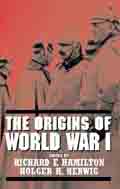 This work poses a straightforward - yet at
the same time perplexing - question about World War I - Why
did it happen? Several of the oft-cited causes are reviewed
and discussed. The argument of the alliance systems is inadequate,
lacking relevance or compelling force. The arguments of mass
demands, those focusing on nationalism, militarism, and social
Darwinism, it is argued, are insufficient, lacking indications
of frequency, intensity, and process (how they influenced the
various decisions). The work focuses on decision-making, on
the choices made by small coteries, in Austria-Hungary, Germany,
Russia, France, Britain, and elsewhere. The decisions made later
by leaders in Japan, the Ottoman Empire, Italy, the Balkans,
and the United States are also explored. The final chapters
review the ‘basic causes’ once again. An alternative
position is advanced, one focused on elites and coteries, their
backgrounds and training, and on their unique agendas.
This work poses a straightforward - yet at
the same time perplexing - question about World War I - Why
did it happen? Several of the oft-cited causes are reviewed
and discussed. The argument of the alliance systems is inadequate,
lacking relevance or compelling force. The arguments of mass
demands, those focusing on nationalism, militarism, and social
Darwinism, it is argued, are insufficient, lacking indications
of frequency, intensity, and process (how they influenced the
various decisions). The work focuses on decision-making, on
the choices made by small coteries, in Austria-Hungary, Germany,
Russia, France, Britain, and elsewhere. The decisions made later
by leaders in Japan, the Ottoman Empire, Italy, the Balkans,
and the United States are also explored. The final chapters
review the ‘basic causes’ once again. An alternative
position is advanced, one focused on elites and coteries, their
backgrounds and training, and on their unique agendas.
Published: 2003; ISBN: 0521817358 Hardback
The Dynamics of Military Revolution, 1300-2050
Edited by MacGregor Knox, Williamson Murray
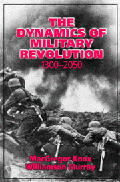 The Dynamics of Military Revolution
aims to bridge a major gap in the emerging literature on revolutions
in military affairs, suggesting that there have been two very
different phenomena at work over the past centuries: 'military
revolutions', which are driven by vast social and political
changes; and 'revolutions in military affairs', which military
institutions have directed, although usually with great difficulty
and ambiguous results. By providing both a conceptual framework
and a historical context for thinking about revolutionary changes
in military affairs, the work establishes a baseline for understanding
the patterns of change, innovation, and adaptation that have
marked war in the Western World since the thirteenth century
- beginning with Edward III's revolutionary changes in medieval
warfare, through the development of modern Western military
institutions in seventeenth-century France, to the cataclysmic
changes of the First World War and the German Blitzkrieg victories
of 1940. This history provides a guide for thinking about military
revolutions in the coming century, which are as inevitable as
they are difficult to predict.
The Dynamics of Military Revolution
aims to bridge a major gap in the emerging literature on revolutions
in military affairs, suggesting that there have been two very
different phenomena at work over the past centuries: 'military
revolutions', which are driven by vast social and political
changes; and 'revolutions in military affairs', which military
institutions have directed, although usually with great difficulty
and ambiguous results. By providing both a conceptual framework
and a historical context for thinking about revolutionary changes
in military affairs, the work establishes a baseline for understanding
the patterns of change, innovation, and adaptation that have
marked war in the Western World since the thirteenth century
- beginning with Edward III's revolutionary changes in medieval
warfare, through the development of modern Western military
institutions in seventeenth-century France, to the cataclysmic
changes of the First World War and the German Blitzkrieg victories
of 1940. This history provides a guide for thinking about military
revolutions in the coming century, which are as inevitable as
they are difficult to predict.
Published 2001; ISBN: 052180079X Hardback
European Culture in the Great War
Edited by Aviel Roshwald, Richard Stites
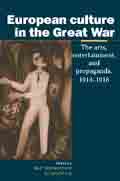 It is commonplace to refer to the First World
War as an historical watershed, but the nature of that great
cataclysm’s impact upon European society and culture remains
a hotly debated topic. Many recent works have dealt with the
Great War’s role in shaping artistic and intellectual
modernism and with the social history of the war. Yet the English-language
literature remains dominated by a disproportionate emphasis
on the western European experience. This book redresses the
balance by giving equal attention to the countries of eastern
and central Europe, and distinguishes itself by focusing specifically
on cultural change during the course of the war, as distinct
from the after-effects and memories of the conflict.
It is commonplace to refer to the First World
War as an historical watershed, but the nature of that great
cataclysm’s impact upon European society and culture remains
a hotly debated topic. Many recent works have dealt with the
Great War’s role in shaping artistic and intellectual
modernism and with the social history of the war. Yet the English-language
literature remains dominated by a disproportionate emphasis
on the western European experience. This book redresses the
balance by giving equal attention to the countries of eastern
and central Europe, and distinguishes itself by focusing specifically
on cultural change during the course of the war, as distinct
from the after-effects and memories of the conflict.
Published 1999; ISBN: 0521570158 Hardback; Published 2002; ISBN: 0521013240 Paperback
Memory and Power in Post-War Europe
Edited by Jan-Werner Müller
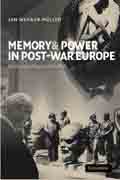 How has memory - collective and individual
- influenced European politics after the Second World War and
after 1989 in particular? How has the past been used in domestic
struggles for power, and how have ‘historical lessons’
been applied in foreign policy? While there is now a burgeoning
field of social and cultural memory studies, mostly focused
on commemorations and monuments, this volume is the first to
examine the connection between memory and politics directly.
It investigates how memory is officially recast, personally
reworked and often violently re-instilled after wars, and, above
all, the ways memory shapes present power constellations. The
chapters combine theoretical innovation in their approach to
the study of memory with deeply historical, empirically based
case studies of major European countries. The volume concludes
with reflections on the ethics of memory, and the politics of
truth, justice and forgetting after 1945 and 1989.
How has memory - collective and individual
- influenced European politics after the Second World War and
after 1989 in particular? How has the past been used in domestic
struggles for power, and how have ‘historical lessons’
been applied in foreign policy? While there is now a burgeoning
field of social and cultural memory studies, mostly focused
on commemorations and monuments, this volume is the first to
examine the connection between memory and politics directly.
It investigates how memory is officially recast, personally
reworked and often violently re-instilled after wars, and, above
all, the ways memory shapes present power constellations. The
chapters combine theoretical innovation in their approach to
the study of memory with deeply historical, empirically based
case studies of major European countries. The volume concludes
with reflections on the ethics of memory, and the politics of
truth, justice and forgetting after 1945 and 1989.
Published 2002; ISBN: 0521806100 Hardback; ISBN: 052100070X Paperback
European Neutrals and Non-Belligerents during the Second World War
Edited by Neville Wylie
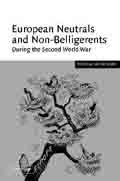 This collection provides the most comprehensive
English-language survey of the conduct of neutral and non-belligerent
states during the war for nearly fifty years. Instead of narrowly
focusing on the few neutrals that survived the war intact, the
volume broadens our understanding of neutrality, by including
chapters on ‘non-belligerents’ and those neutrals
of south-east Europe, such as Romania and Yugoslavia. The essays
focus on how individual neutral governments perceived international
developments and throw light on the domestic political circumstances
that critically affected their response to the course of the
war. They therefore provide the political context that has been
overlooked in recent controversies surrounding their humanitarian
and financial activities. While based on the authors’
own research, the essays draw widely on secondary literature
and provide invaluable analytical introductions to the large
amount of historical writing on these countries which is unavailable
in English.
This collection provides the most comprehensive
English-language survey of the conduct of neutral and non-belligerent
states during the war for nearly fifty years. Instead of narrowly
focusing on the few neutrals that survived the war intact, the
volume broadens our understanding of neutrality, by including
chapters on ‘non-belligerents’ and those neutrals
of south-east Europe, such as Romania and Yugoslavia. The essays
focus on how individual neutral governments perceived international
developments and throw light on the domestic political circumstances
that critically affected their response to the course of the
war. They therefore provide the political context that has been
overlooked in recent controversies surrounding their humanitarian
and financial activities. While based on the authors’
own research, the essays draw widely on secondary literature
and provide invaluable analytical introductions to the large
amount of historical writing on these countries which is unavailable
in English.
Published 2001; ISBN: 0521643589 Hardback
Duckworth
Origins of the Peloponnesian War
G de Ste. Croix
The most profound large-scale treatment of the origins of the war, and one of the most important contributions to Greek political history and the study of Thucydides for many years. The late G.E.M. de Ste Croix was a Fellow of New College, Oxford.
ISBN: 0715617281 Paperback
Frank Cass
American War Plans, 1890-1939
Steven T. Ross
 By the close of the 19th century, the
United States was no longer a continental power, but had become
a nation with interests that spanned the globe from the Caribbean
to China. Consequently, the country faced a new set of strategic
concerns, ranging from enforcing the Monroe Doctrine to defending
the Philippines.
By the close of the 19th century, the
United States was no longer a continental power, but had become
a nation with interests that spanned the globe from the Caribbean
to China. Consequently, the country faced a new set of strategic
concerns, ranging from enforcing the Monroe Doctrine to defending
the Philippines.
As a result of the United States' new geostrategic environment, the armed services had to establish a system for the creation of war plans to defend the country's interests against possible foreign aggression. A Joint Army and Navy Board, established in 1903, ordered the creation of war plans to deal with real and potential threats to American security. Each major country was assigned a colour: Germany was Black, Great Britain Red, Japan Orange, Mexico Green and China Yellow. War plans were then devised in case Washington decided to use force against these or other powers.
Based on plans and studies drawn from a variety of archival sources, this volume describes the origin and evolution of the various plans and places them within the context of the United States' foreign and military policies.
Published 2002; ISBN: 0714653055 Hardback
Growth of Fighter Command, 1936–1940
Air Defence of Great Britain, Vol. I
T C G James
Edited and with an Introduction by Sebastian Cox, Head of the
Air Historical Branch of the Ministry of Defence
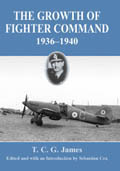 This is the first volume of the original
classified study of the Air Defence of Great Britain, covering
the pre-war expansion of Fighter Command and the creation of
the world's first integrated air defence system. This became
known as the 'Dowding System' and was to save Britain from defeat
in 1940. This volume takes the story up to the Battle of France
and Fighter Command's operations in the Dunkirk evacuation and
includes a startling analysis of the arguments in the Air Staff
and Cabinet over fighter reinforcements for France.
This is the first volume of the original
classified study of the Air Defence of Great Britain, covering
the pre-war expansion of Fighter Command and the creation of
the world's first integrated air defence system. This became
known as the 'Dowding System' and was to save Britain from defeat
in 1940. This volume takes the story up to the Battle of France
and Fighter Command's operations in the Dunkirk evacuation and
includes a startling analysis of the arguments in the Air Staff
and Cabinet over fighter reinforcements for France.
Published 2001; ISBN: 0714651184 Hardback
The
Future of Non-Lethal Weapons
Technologies, Operations, Ethics and Law
Nick Lewer, Centre for Conflict Resolution, University of Bradford
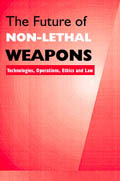 Topics include: an overview of the future
of non-lethal weapons, emerging non-lethal technologies, military
and police operational deployment of non-lethal weapons, a scientific
evaluation of the effectiveness of non-lethal weapons, and changes
in international law needed to take into account non-lethal
technologies. This book also explores developments in genomics
leading to new chemical incapacitants, implications for arms
control and proliferation, the role of non-lethal weapons in
human rights abuses and conceptual, theoretical and analytical
perspectives on the nature of non-lethal weapons development.
Topics include: an overview of the future
of non-lethal weapons, emerging non-lethal technologies, military
and police operational deployment of non-lethal weapons, a scientific
evaluation of the effectiveness of non-lethal weapons, and changes
in international law needed to take into account non-lethal
technologies. This book also explores developments in genomics
leading to new chemical incapacitants, implications for arms
control and proliferation, the role of non-lethal weapons in
human rights abuses and conceptual, theoretical and analytical
perspectives on the nature of non-lethal weapons development.
The Future of Non-Lethal Weapons will be of interest to military and police forces, security specialists, peace and conflict researchers, students and human rights activists.
Publication 2002; ISBN: 0714653098 Hardback; ISBN: 0714682659 Paperback
War,
Science and Terrorism
From Laboratory to Open Conflict
Jacques Richardson
 This work describes the application of
research to the evolution of weapons. He shows how natural,
engineering, information and environmental sciences are thoroughly
exploited how even social science is applied to recruitment,
battlefield and logistical management, and careful preparation
of terroristic acts. Have we allowed science to become "an
extension of war by other means"? Today's military-industrial
complex depends on creative research to conceive novel and more
efficient weapons. Modern arms result from streamlined co-operation
between laboratory investigators, designers, manufacturers and
client governments. The killing power of the best equipped fighters
depends, therefore, on scientific information. Yet, ironically,
much military intervention also serves the public well. Funding
of scientific research is also considered. Scientific research
around the world has been funded, as much as 60 per cent, by
military establishments. Therefore about half of scientists
and their laboratories are funded by war budgets. With this
in mind, finally the author asks whether governments can, would
or should continue to be so generous with the research community
in years to come.
This work describes the application of
research to the evolution of weapons. He shows how natural,
engineering, information and environmental sciences are thoroughly
exploited how even social science is applied to recruitment,
battlefield and logistical management, and careful preparation
of terroristic acts. Have we allowed science to become "an
extension of war by other means"? Today's military-industrial
complex depends on creative research to conceive novel and more
efficient weapons. Modern arms result from streamlined co-operation
between laboratory investigators, designers, manufacturers and
client governments. The killing power of the best equipped fighters
depends, therefore, on scientific information. Yet, ironically,
much military intervention also serves the public well. Funding
of scientific research is also considered. Scientific research
around the world has been funded, as much as 60 per cent, by
military establishments. Therefore about half of scientists
and their laboratories are funded by war budgets. With this
in mind, finally the author asks whether governments can, would
or should continue to be so generous with the research community
in years to come.
Published 2002; ISBN: 0714653128 Hardback; ISBN: 0714682691 Paperback
German Capital Ships and Raiders in World War II : Vol 1, From Graf Spee to the Bismarck, 1939-1941
Edited by: Eric Grove (University of Hull)
This is a compendium of seven Naval Staff Histories which deals with operations by major German surface units as follows: the destruction of the pocket battleship Graf Spee, by three Royal Navy light cruisers off the River Plate; the hunt for the Bismark; the Battle of the North Cape when Scharnhorst was sunk by HMS Duke of York in a snowy, night action; the escape of the Gneisenau and the Scharnhorst up the English Channel through British defences in the "Channel Dash"; the series of attacks on Tirpitz by aircraft carriers; long-range bombers and midget submarines in her Norwegian lair; and the predations of disguised merchant raiders such as the notorious Pinguin.
Published 2002; ISBN: 0714652083 Hardback
German Capital Ships and Raiders in World War II : Vol 2, From Scharnhorst to Tirpitz, 1942-1944
Edited by: Eric Grove (University of Hull)
 By 1942 the Kreigsmarine was largely confined
to harbour but none the less the Royal Navy still pursued it.
In February 1942, two battlecruisers escaped with a daring,
daylight sortie up the channel. Following this, there was a
series of battles in Arctic waters which left the Scharnhorst
sunk in a blizzard by HMS Duke of York and the Tirpitz capsized
by giant bombs.
By 1942 the Kreigsmarine was largely confined
to harbour but none the less the Royal Navy still pursued it.
In February 1942, two battlecruisers escaped with a daring,
daylight sortie up the channel. Following this, there was a
series of battles in Arctic waters which left the Scharnhorst
sunk in a blizzard by HMS Duke of York and the Tirpitz capsized
by giant bombs.
This second volume describes the disproportionate effort expended in trying to sink the finest warships ever built. The Prinz Eugen for example withstood a nuclear explosion after the war ended.
Published 2002; ISBN: 0714652830 Hardback
Alfred Von Schlieffen's Military Writings
Edited by: Robert Foley (King's College, London) Series Editor: John Gooch (University of Leeds) Brian Holden Reid (King's College, London)
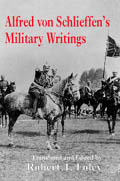 A collection of writings by Generalfeldmarschall
Alfred Graf von Schlieffen, one of Imperial Germany's more intriguing
figures. Schlieffens 15 years as Chief of the general staff
left his mark upon both military and political institutions
within Wilhelmine Germany. Despite never having written a comprehensive
work of theory, his ideas have inspired countless written articles
in support and many argue that his theories brought ruin to
Germany and much of Europe. This book provides translations
of Schlieffen's staff rides as well as sections from the archives
not previously published.
A collection of writings by Generalfeldmarschall
Alfred Graf von Schlieffen, one of Imperial Germany's more intriguing
figures. Schlieffens 15 years as Chief of the general staff
left his mark upon both military and political institutions
within Wilhelmine Germany. Despite never having written a comprehensive
work of theory, his ideas have inspired countless written articles
in support and many argue that his theories brought ruin to
Germany and much of Europe. This book provides translations
of Schlieffen's staff rides as well as sections from the archives
not previously published.
Published 2003; ISBN: 0714649996 Hardback
Hodder Arnold
The South African War 1899-1902
Bill Nasson
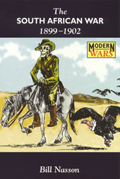 The South African War or Anglo-Boer War of 1899-1902 was a major
colonial war which finally rounded off the British conquest
of Southern Africa. While ultimate British victory was scarcely
in doubt, the unsettling experience of having to field an imperial
army of 450,000 troops to break two of the world's tiniest agrarian
states gave imperial society much to reflect upon, both during
and after the conflict.
The South African War or Anglo-Boer War of 1899-1902 was a major
colonial war which finally rounded off the British conquest
of Southern Africa. While ultimate British victory was scarcely
in doubt, the unsettling experience of having to field an imperial
army of 450,000 troops to break two of the world's tiniest agrarian
states gave imperial society much to reflect upon, both during
and after the conflict.
To the Boer 'bitter-enders' the outcome of the war was never anything other than humiliation. Yet the defeat of Boer interests was less evident. Although many of the black population became involved in the conflict, white supremacy remained intact; and the successes of the Boers in the field as well as the trials and tribulations of their families in defeat, restoked a nationalist Afrikaner identity, which would go on to become a key element in the policy of apartheid. Only now, a hundred years later, are some of the more baleful legacies of the war being addressed.
Nasson's new history is a crisp, up-to-date account not only of the military struggle but also of the whole web of miscalculations and shattered illusions that surrounded it, spreading far beyond the battlefields.
Published 1999; ISBN: 0340614277.
The Crimean War
Winfried Baumgart
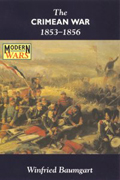 The Crimean War extended into the Baltic, the White Sea, and even
the Pacific. Baumgart argues that if the war had continued after
1856, the First World War would have taken place 60 years earlier.
Not only were the five great European powers directly or indirectly
involved; but all the smaller European states that had remained
neutral sooner or later confronted the question of whether to
join the fray or to stay outside. Ultimately the fighting ceased
because diplomacy never lost its control over the use of war
as an instrument in power politics.
The Crimean War extended into the Baltic, the White Sea, and even
the Pacific. Baumgart argues that if the war had continued after
1856, the First World War would have taken place 60 years earlier.
Not only were the five great European powers directly or indirectly
involved; but all the smaller European states that had remained
neutral sooner or later confronted the question of whether to
join the fray or to stay outside. Ultimately the fighting ceased
because diplomacy never lost its control over the use of war
as an instrument in power politics.
The author brings to this new study fresh insight, probing the conflict's key issues: its origins and diplomacy; the war aims of the belligerent powers; the capacity and characteristics of their armies; and the nature of the fighting itself.
Published 1999; ISBN: 034061465X
Longman History
The Korean War
Steven Hugh Lee
A collection of essays - including 3 that have never been published before - by one of the leading figures in cultural history. Professor Jordanova examines and reinterprets the writings of eighteenth-century thinkers and, in the process, sheds light on contemporary views on issues such as motherhood, sexuality, the body, art and medicine. The volume includes some of the author's most controversial and pioneering work, all the pieces have been revised in the light of the latest historiography and much of the material is published here for the first time.
ISBN: 0582319889 Paperback
Manchester University Press
War and the media
Philip M Taylor
The Gulf War of 1991 was the highest profile media war in history. Never before had so many journalists attempted to cover a war from both sides of the conflict. This book traces the role of the media in the Gulf War and examines the attempts by both the coalition and Iraq to influence public opinion through propaganda and persuasion. Philp Taylor asks how much the public were being told and how much was held back. Analysing the key news stories of the conflict he looks at the efforts of the American-led coalition to persuade television audiences and newspaper readers to take a 'right view' of what was happening and of the Iraqi government's propaganda campaigns concerning civilian damage and the 'Mother of all Battles'. This revised edition features a new introduction and bibliography, which brings the study fully up-to-date.
Published 1998; ISBN: 0719055504 Paperback
The Debate on the American Civil War Era
Hugh Tulloch
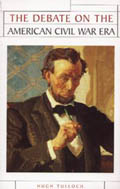 This study is the first to critically
survey the changing and highly controversial historical literature
surrounding the American Civil War era, from contemporary interpretations
up to the present. The racial question was one of the central
causes of the war; there was recognition of the need for America
to conform wholly to the Declaration of Independence that 'all
men are created equal'. This moral dimension lies at the heart
of the historiographical debate, and just as one group of historians
has attempted to play down the moral significance of slavery
and the war, so another has insisted upon its paramount importance.
The book both analyses both historians' attitudes and assumptions,
and suggests that each writer's perspective was partly determined
by the dictates of time and place. The six chapters deal, respectively,
with the American historical profession, slavery, abolitionism,
the causes of the civil war, the civil war itself and reconstruction.
This study is the first to critically
survey the changing and highly controversial historical literature
surrounding the American Civil War era, from contemporary interpretations
up to the present. The racial question was one of the central
causes of the war; there was recognition of the need for America
to conform wholly to the Declaration of Independence that 'all
men are created equal'. This moral dimension lies at the heart
of the historiographical debate, and just as one group of historians
has attempted to play down the moral significance of slavery
and the war, so another has insisted upon its paramount importance.
The book both analyses both historians' attitudes and assumptions,
and suggests that each writer's perspective was partly determined
by the dictates of time and place. The six chapters deal, respectively,
with the American historical profession, slavery, abolitionism,
the causes of the civil war, the civil war itself and reconstruction.
Published 1999; ISBN: 0719049385 Paperback
Cold War women: The international activities of American women's organisations
Helen Laville
After World War II, women across the globe claimed that, to avoid a repetition of the death and devastation of the conflict, they must have a more active role in world affairs. American women shared this belief, asserting that their internationalism was vital to secure a peaceful future. American women's loyalty to their European sisters, however, was quickly replaced by their loyalty to their nation. Cold War women examines how the internationalist ambitions of American women's organisations in the years 1945 to 1960 gave way to other concerns. In the emerging Cold War, American women abandoned their relationship with their foreign sisters in favour of solidarity with their national brothers. Far from being advocates of internationalism, American women had become agents for Americanism. Confronting a propaganda campaign from Soviet-backed women's organisations, American women tried to export a vision of the American way of life and of women's proper place within it. They were not alone. In the mission to export their organisations as a model for women across the globe, American women were supported by their government, be it through advice and direction or through the financial backing of the CIA. This fascinating study will be invaluable to those in the field of gender and women's history, cultural studies and American history.
Published 2002; ISBN: 0719058562 Hardback
Oxford University Press
Mirrors of Destruction: War, Genocide, and Modern Identity
Omer Bartov
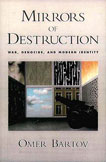 This book examines the relationship
between total war, state-organized genocide, and the emergence
of modern identity. Omer Bartov demonstrates that, in the twentieth
century, there have been intimate links between military conflict,
mass murder of civilian populations, and the definition and
categorization of groups and individuals. The Holocaust, he
argues, can only be understood within the context of the century's
predilection to apply systematic and destructive methods to
resolve conflicts over identity. His study follows the changing
relationships between Jews and non-Jews in France and Germany
from the outbreak of World War I to the present . He takes a
close look at the glorification of war between 1914-18 and examines
the pacifist reaction in interwar France to show how it contributed
to a climate of collaboration with dictatorship and mass murder.
He also provides detailed analyses of modern apocalyptic visions
and pursuits for internal enemies. The book is an important
new perspective on some of the most crucial issues of our time.
This book examines the relationship
between total war, state-organized genocide, and the emergence
of modern identity. Omer Bartov demonstrates that, in the twentieth
century, there have been intimate links between military conflict,
mass murder of civilian populations, and the definition and
categorization of groups and individuals. The Holocaust, he
argues, can only be understood within the context of the century's
predilection to apply systematic and destructive methods to
resolve conflicts over identity. His study follows the changing
relationships between Jews and non-Jews in France and Germany
from the outbreak of World War I to the present . He takes a
close look at the glorification of war between 1914-18 and examines
the pacifist reaction in interwar France to show how it contributed
to a climate of collaboration with dictatorship and mass murder.
He also provides detailed analyses of modern apocalyptic visions
and pursuits for internal enemies. The book is an important
new perspective on some of the most crucial issues of our time.
Published 2000; ISBN: 0195077237 Hardback
Kennedy's Wars: Berlin, Cuba, Laos and Vietnam
Lawrence Freedman
 John Fitzgerald Kennedy's thousand days
as President of the United States was filled with crisis and incident.
The Cold War was at its height, and Kennedy faced challenges over
the future of West Berlin, Cuba and Vietnam. Deeply fearful of a
third world war, yet conscious that he must not be seen to be losing
ground to Communism, Kennedy picked his way through these crises,
trying to maintain American interests while reducing the risk of
nuclear confrontation. At the time of his assassination, relations
with the Soviet Union had improved significantly with the easing
of tensions over Berlin and the signing of the test ban treaty,
but he had yet to find a definitive solution to the Cuba problem
and the situation in Vietnam was deteriorating. While recent biographies
of Kennedy have addressed flaws in his character and private life,
Freedman focuses on how he handled these big issues of war and peace.
Drawing on a wealth of material, including newly released documents,
and the best of Cold War scholarship, Freedman provides a compelling
portrait of Kennedy. Particular attention is given to his views
about international affairs and his conviction that the Third World
was becoming the most important arena for Cold War competition.
The book is full of drama as we watch Kennedy wrestling with a succession
of major crises - taking advice, assessing situations, and forming
judgements, coping with truculent allies as well as determined opponents.
John Fitzgerald Kennedy's thousand days
as President of the United States was filled with crisis and incident.
The Cold War was at its height, and Kennedy faced challenges over
the future of West Berlin, Cuba and Vietnam. Deeply fearful of a
third world war, yet conscious that he must not be seen to be losing
ground to Communism, Kennedy picked his way through these crises,
trying to maintain American interests while reducing the risk of
nuclear confrontation. At the time of his assassination, relations
with the Soviet Union had improved significantly with the easing
of tensions over Berlin and the signing of the test ban treaty,
but he had yet to find a definitive solution to the Cuba problem
and the situation in Vietnam was deteriorating. While recent biographies
of Kennedy have addressed flaws in his character and private life,
Freedman focuses on how he handled these big issues of war and peace.
Drawing on a wealth of material, including newly released documents,
and the best of Cold War scholarship, Freedman provides a compelling
portrait of Kennedy. Particular attention is given to his views
about international affairs and his conviction that the Third World
was becoming the most important arena for Cold War competition.
The book is full of drama as we watch Kennedy wrestling with a succession
of major crises - taking advice, assessing situations, and forming
judgements, coping with truculent allies as well as determined opponents.
Published 2001; ISBN: 0195134532 Hardback
Flares of Memory: Stories of Childhood During the Holocaust
Edited by Anita Brostoff - With Sheila Chamovitz
 In a series of writing workshops at
the Holocaust Center of Pittsburgh, survivors assembled recently
to remember the pivotal moments in which their lives were irreparably
changed by the Nazis. These "flares of memory" invoke lost childhoods,
preserving the voices of over forty Jews from throughout Europe
who experienced a history that cannot be forgotten-by them nor
us. Including a timeline that chronicles the rise of the Nazis,
their devastating campaigns for control of Europe, and the successive
edicts that would annihilate millions, Flares of Memory consists
of 92 brief vignettes arranged both chronologically and thematically.
Survivors from Munich, Austria, Poland, Hungary, Lithuania,
and the Netherlands recreate the disbelief and chaos that ensued
as families were separated, political rights were abolished,
and synagogues and Jewish businesses were destroyed-before and
especially after Kristallnacht. "We had entered a twilight
zone between memories of earning our keep at our occupations
and the fear of becoming game during hunting season," writes
one survivor. Others remember the daily humiliation, the quiet
heroes among their friends, and the painful abandonment by neighbours
as Jews were restricted to ghettos, forced to don yellow stars,
and loaded like cattle in trains destined for the camps: "We
were completely stripped of all human identity." Vivid
memories of hunger, disease, and a daily existence dependent
on cruel luck in Dachau, Auschwitz, and other concentration
camps provide penetrating testimonies to the ruthlessness of
the Nazi killing machine, yet they also bear witness to the
resilience and fortitude of individual souls bombarded by evil.
This book also includes poignant recollections of American liberators
who were often devastated by the horrors that they discovered
after the fall of the Nazis. "A mix of emotions-disbelief, rage-overwhelmed
us; tears blinded our eyes," recalls one soldier. Flares of
Memory will inspire these emotions and will stay with you, long
after you finish its pages.
In a series of writing workshops at
the Holocaust Center of Pittsburgh, survivors assembled recently
to remember the pivotal moments in which their lives were irreparably
changed by the Nazis. These "flares of memory" invoke lost childhoods,
preserving the voices of over forty Jews from throughout Europe
who experienced a history that cannot be forgotten-by them nor
us. Including a timeline that chronicles the rise of the Nazis,
their devastating campaigns for control of Europe, and the successive
edicts that would annihilate millions, Flares of Memory consists
of 92 brief vignettes arranged both chronologically and thematically.
Survivors from Munich, Austria, Poland, Hungary, Lithuania,
and the Netherlands recreate the disbelief and chaos that ensued
as families were separated, political rights were abolished,
and synagogues and Jewish businesses were destroyed-before and
especially after Kristallnacht. "We had entered a twilight
zone between memories of earning our keep at our occupations
and the fear of becoming game during hunting season," writes
one survivor. Others remember the daily humiliation, the quiet
heroes among their friends, and the painful abandonment by neighbours
as Jews were restricted to ghettos, forced to don yellow stars,
and loaded like cattle in trains destined for the camps: "We
were completely stripped of all human identity." Vivid
memories of hunger, disease, and a daily existence dependent
on cruel luck in Dachau, Auschwitz, and other concentration
camps provide penetrating testimonies to the ruthlessness of
the Nazi killing machine, yet they also bear witness to the
resilience and fortitude of individual souls bombarded by evil.
This book also includes poignant recollections of American liberators
who were often devastated by the horrors that they discovered
after the fall of the Nazis. "A mix of emotions-disbelief, rage-overwhelmed
us; tears blinded our eyes," recalls one soldier. Flares of
Memory will inspire these emotions and will stay with you, long
after you finish its pages.
Published 2001; ISBN: 0195138716 Hardback
Palgrave Macmillan
The Algerian War and the French Army, 1954-62: Experiences, Images, Testimonies
Martin S. Alexander, Martin Evans, J.F.V. Keiger
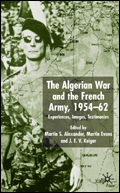 The Algerian War 1954-62 was one of
the most prolonged and violent examples of decolonization. At
times horribly savage, it was an undeclared war in the sense
that no formal declaration of hostilities was ever made. Bringing
to an end one hundred and thirty two years of French rule, the
Algerian struggle caused the fall of six French prime ministers,
the collapse of the Fourth Republic and expulsion of one million
French settlers. This volume, bringing together leading experts
in the field, focuses on one of the key actors in the drama
- the French army. They show that the Algerian War was just
as much about conflicts of ideas, beliefs and loyalties as it
was about simple military operations. In this way, the collection
goes beyond polemic and recrimination to explore the many and
varied nuances of what was one of the historically most important
of the grand style colonial wars.
The Algerian War 1954-62 was one of
the most prolonged and violent examples of decolonization. At
times horribly savage, it was an undeclared war in the sense
that no formal declaration of hostilities was ever made. Bringing
to an end one hundred and thirty two years of French rule, the
Algerian struggle caused the fall of six French prime ministers,
the collapse of the Fourth Republic and expulsion of one million
French settlers. This volume, bringing together leading experts
in the field, focuses on one of the key actors in the drama
- the French army. They show that the Algerian War was just
as much about conflicts of ideas, beliefs and loyalties as it
was about simple military operations. In this way, the collection
goes beyond polemic and recrimination to explore the many and
varied nuances of what was one of the historically most important
of the grand style colonial wars.
Published 2002; ISBN: 0333774566
The Afghanistan Wars
William Maley
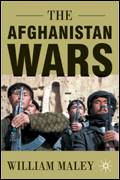 The current situation in Afghanistan
is all too familiar, but its past remains unfamilar to many.
William Maley offers a valuable insight into Afghanistan's wars
and the domestic, regional, and international politics that
have exposed the population of what was once one of the most
stable states in Asia to enormous damage. Maley examines the
Soviet-Afghan War, the Afghan Civil War and the current conflict
in the context of Afghanistan's cultural, social, political
and geographical complexities. These are complexities with which
policy makers, journalists, students and scholars must now come
to terms.
The current situation in Afghanistan
is all too familiar, but its past remains unfamilar to many.
William Maley offers a valuable insight into Afghanistan's wars
and the domestic, regional, and international politics that
have exposed the population of what was once one of the most
stable states in Asia to enormous damage. Maley examines the
Soviet-Afghan War, the Afghan Civil War and the current conflict
in the context of Afghanistan's cultural, social, political
and geographical complexities. These are complexities with which
policy makers, journalists, students and scholars must now come
to terms.
Published 2002; ISBN: 033380290X
The Irish Revolution, 1913-1923
Joost Augusteijn
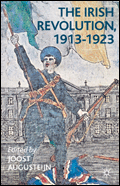 This collection of essays brings together
the main historians of the Irish Revolution, 1913-1923. Through
detailed research and wide-ranging analysis of key themes, they
provide the most up-to-date answers to, and debate on, the fundamental
questions concerning this period, including: what was the nature
of the revolution; what were its causes; how was the war fought
and ended; and what have been the repercussions? Essential reading
for all those interested in Ireland and the study of revolution.
This collection of essays brings together
the main historians of the Irish Revolution, 1913-1923. Through
detailed research and wide-ranging analysis of key themes, they
provide the most up-to-date answers to, and debate on, the fundamental
questions concerning this period, including: what was the nature
of the revolution; what were its causes; how was the war fought
and ended; and what have been the repercussions? Essential reading
for all those interested in Ireland and the study of revolution.
Published 2002; ISBN: 0333982258
What were the Crusades?
Jonathan Riley-Smith
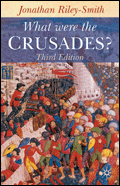 Few attempts had been made to define
'the crusade' before the first edition of this book was published
in 1977. Since then, a number of historians have built on Jonathan
Riley-Smith's conclusions. Their research has been incorporated
into this new, thoroughly revised, third edition of a classic
starting point for any study of the crusading movement. Among
other key aspects, the book deals with causes for crusading,
the legitimising authority of the papacy, recruitment, and the
nature of the crusade vow and its consequences. This new edition
also features a useful chronology and brief biographies of some
crusaders, both real and imaginary.
Few attempts had been made to define
'the crusade' before the first edition of this book was published
in 1977. Since then, a number of historians have built on Jonathan
Riley-Smith's conclusions. Their research has been incorporated
into this new, thoroughly revised, third edition of a classic
starting point for any study of the crusading movement. Among
other key aspects, the book deals with causes for crusading,
the legitimising authority of the papacy, recruitment, and the
nature of the crusade vow and its consequences. This new edition
also features a useful chronology and brief biographies of some
crusaders, both real and imaginary.
Published 2002; ISBN: 0333949048
Pheonix Press
Wartime Women: A Mass-Observation Anthology
Dorothy Sheridan
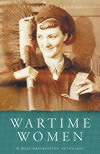 The Mass-Observation organization was set
up in 1937 with the aim of recording everyday life in Britain.
Dorothy Sheridan has searched the organization's archives to
put together this anthology of women's experiences in World
War II.
The Mass-Observation organization was set
up in 1937 with the aim of recording everyday life in Britain.
Dorothy Sheridan has searched the organization's archives to
put together this anthology of women's experiences in World
War II.
Published 2002; ISBN: 1842126172
The Spanish Cockpit
Franz Borkanau
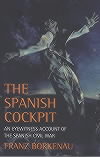 Newly introduced by Hugh
Thomas, this young man's eye-witness account of the Spanish
Civil War has become a classic. "The Spanish Cockpit is not
only a model of what the study of a revolution should be, but
one of the best books ever published on Spain" Gerald Brenan.
Newly introduced by Hugh
Thomas, this young man's eye-witness account of the Spanish
Civil War has become a classic. "The Spanish Cockpit is not
only a model of what the study of a revolution should be, but
one of the best books ever published on Spain" Gerald Brenan.
Published 2000; ISBN: 1842120069
Warfare in the Eighteenth Century
Black, Jeremy
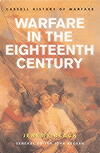 With the major European powers ruling
territories in North and South America, Africa, India and across
the Pacific, the wars of the 18th century were the first truly
global conflicts, the first "world wars". Sometimes,
conflict on the edges of empire could trigger new wars in Europe.
The balance of power there changed as France weakened and Frederick
the Great established Prussia as a new military power to be
reckoned with. From the forests of New England to the Philippines,
this is an account of one of the most fascinating periods of
military history.
With the major European powers ruling
territories in North and South America, Africa, India and across
the Pacific, the wars of the 18th century were the first truly
global conflicts, the first "world wars". Sometimes,
conflict on the edges of empire could trigger new wars in Europe.
The balance of power there changed as France weakened and Frederick
the Great established Prussia as a new military power to be
reckoned with. From the forests of New England to the Philippines,
this is an account of one of the most fascinating periods of
military history.
Published 2002; ISBN: 0304362123
Yale University Press
Kosovo: War and Revenge
Tim Judah
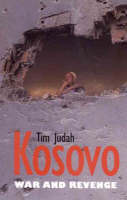 This is the definitive account of how
Kosovo became the crucible of one of the twentieth century's
most poisonous ethnic conflicts. Written by a seasoned journalist
who witnessed the Balkan conflagration and its aftermath, the
book presents a gripping analysis of the origins of the Serb-Albanian
conflict, the course of the battle, the issues and personalities,
and options for the future. In this second edition Tim Judah
updates the story to, and beyond, the fall of Milosevic.
This is the definitive account of how
Kosovo became the crucible of one of the twentieth century's
most poisonous ethnic conflicts. Written by a seasoned journalist
who witnessed the Balkan conflagration and its aftermath, the
book presents a gripping analysis of the origins of the Serb-Albanian
conflict, the course of the battle, the issues and personalities,
and options for the future. In this second edition Tim Judah
updates the story to, and beyond, the fall of Milosevic.
Published 2002; ISBN: 0300097255
Mass Atrocity, Ordinary Evil, and Hannah Arendt: Criminal Consciousness in Argentina's Dirty War
Mark J. Osiel
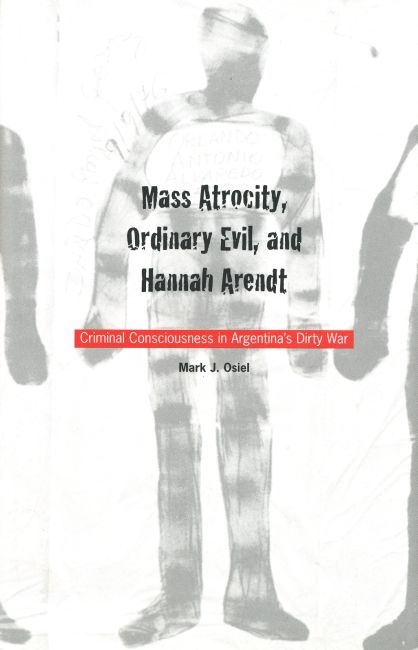 Is it possible that the soldiers of mass
atrocities - Adolph Eichmann in Nazi Germany and Alfredo Astiz
in Argentina's "Dirty War", for example - act under conditions
that prevent them from recognising their crimes? In the aftermath
of catastrophic, state-sponsored mass murder, how are criminal
courts to respond to those who either gave or carried out the
military orders that seem unequivocally criminal?
Is it possible that the soldiers of mass
atrocities - Adolph Eichmann in Nazi Germany and Alfredo Astiz
in Argentina's "Dirty War", for example - act under conditions
that prevent them from recognising their crimes? In the aftermath
of catastrophic, state-sponsored mass murder, how are criminal
courts to respond to those who either gave or carried out the
military orders that seem unequivocally criminal?
This important book addresses Hannah Arendt's controversial argument that perpetrators of mass crimes are completely unaware of their wrongdoing, and therefore existing criminal laws do not adequately address these defendants. Mark Osiel applies Arendt's ideas about the kind of people who implement bureaucratised large-scale atrocities to Argentina's "Dirty War" of the 1970s, and he also delves into the social conditions that could elicit such reprehensible conduct. He focuses on Argentine navy captain Astiz, who led one of the most notorious abduction squads, to discover how he and other junior officers could justify the murders of more than ten thousand suspected "subversives".
Osiel concludes that legal stipulations labelling certain deeds as manifestly illegal are indefensible. He calls for a significant change in the laws of war to preserve both justice and the possibility of dialogue between factions in such sharply divided societies as Argentina. Osiel's proposals have profound implications for future prosecutions of Pinochet's lieutenants, Milosevic's henchmen, the willing executioners of Rwanda and East Timor, and other perpetrators of state-endorsed murder and torture.
Published 2002; ISBN: 0300087535
Voices of Revolution, 1917
Translation by Mark D. Steinberg
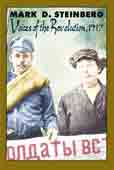 Although much has been written about
the political history of the Russian revolution, the human story
of what the revolution meant to ordinary people has rarely been
told. This book gives voice to the experiences, thoughts, and
feelings of the Russian people, including workers, peasants,
and soldiers, as expressed in their own words during the vast
political, social, and economic upheavals of 1917.
Although much has been written about
the political history of the Russian revolution, the human story
of what the revolution meant to ordinary people has rarely been
told. This book gives voice to the experiences, thoughts, and
feelings of the Russian people, including workers, peasants,
and soldiers, as expressed in their own words during the vast
political, social, and economic upheavals of 1917.
The documents in the volume include letters from individuals to newspapers, institutions, or leaders; collective resolutions and appeals; and even poetry. Selected from the State Archive of the Russian Federation in Moscow, nearly all the texts are published here for the first time. In these writings we hear the voices of ordinary Russians seeking to understand the revolution and make sense of the values, ideals, and discontents of their turbulent times. Not only do they speak of their particular needs and desires, notably for solutions to the economic crisis or an end to the war, they also reveal how relatively unprivileged Russians thought about such questions as political power, freedom, justice, democracy, social class, nationhood, and civic morality. Mark Steinberg provides introductions to the documents, explaining the language of popular revolution in Russia and setting the writings in the context of the history of the time.
Published 2002; ISBN: 0300090161

